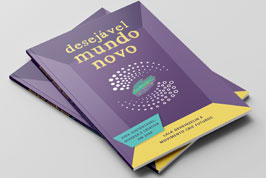Seções
Temas do Cotidiano
Media
Clique na imagem acima para comprar Related Pages
Crie Futuros > Construindo coletivamente nossos Futuros Desejáveis > Estudos de Futuro - Previsões para 2011, The Futurist
Estudos de Futuro - Previsões para 2011, The Futurist
Última modificação 17:00, 28 Set 2010 por
De $1Conteúdosem cabeçalhosThe OUTLOOK 2011 report from THE FUTURIST magazine examines the key trends in technology, the environment, the economy, international relations, etc., in order to paint a full and credible portrait of our likely future. The magazine has released the top ten forecasts from Outlook 2011, plus more than 300 forecasts from previous reports, on the World Future Society’s Web site. http://www.wfs.org/Forecasts_From_The_Futurist_Magazine Our goal in compiling this list has been to provoke thought and inspire action. World Future Society members can log in to the website and comment on these top ten forecasts. Not a member? Join the World Future Society today and get The Futurist in print and online and much more. 1. Physicists could become the leading economic forecasters of tomorrow. Unlike mainstream economists, who rely on averages, econophysicists study complex systems, feedback loops, cascading effects, irrational decision making, and other destabilizing influences, which may help them to foresee economic upheavals. 2. Environmentalists may embrace genetically modified crops as a carbon-reduction technology. Like nuclear power, genetically modified crops have long been the bane of environmentalists, but Stewart Brand, author of Whole Earth Discipline, argues that there are myriad benefits to them as C02 sinks. 3. Search engines will soon include spoken results, not just text. Television broadcasts and other recordings could be compiled and converted using programs developed by the Fraunhofer Institute for Intelligent Analysis. 4. Will there be garbage wars in the future?Trash producers in the developed world will ship much more of their debris to repositories in developing countries. This will inspire protests in the receiving lands. Beyond 2025 or so, the developing countries will close their repositories to foreign waste, forcing producers to develop more waste-to-energy and recycling technologies. 5. The notion of class time as separate from non-class time will vanish. The Net generation uses technologies both for socializing and for working and learning, so their approach to tasks is less about competing and more about working as teams. In this way, social networking is already facilitating collaborative forms of learning outside of classrooms and beyond formal class schedules. 6. The future is crowded with PhDs.The number of doctorate degrees awarded in the <place w:st="on"><country-region w:st="on">United States</country-region></place> has risen for six straight years, reaching record <metricconverter productid="48,802 in" w:st="on">48,802 in</metricconverter> 2008, according to the National Science Foundation's Survey of Earned Doctorates. One-third of these degrees (33.1%) went to temporary visa holders, up from 23.3% in 1998. 7. Cities in developed countries could learn sustainability from so-called slums in the developing world.Dwellers of "slums," favelas, and ghettos have learned to use and reuse resources and commodities more efficiently than their wealthier counterparts. The neighborhoods are high-density and walkable, mixing commercial and residential areas rather than segregating these functions. In many of these informal cities, participants play a role in communal commercial endeavors such as growing food or raising livestock. 8. Cooperatively owned smart cars and roads will replace dumb, individual gas guzzlers. With 800 million cars on the planet to serve 7.8 billion people, personal transportation is a dominant force in our lives. But the emergence of car-sharing and bike-sharing schemes in urban areas in both the <country-region w:st="on">United States</country-region> and <place w:st="on">Europe</place> have established alternative models and markets for fractional or on-demand mobility, says MIT's Ryan C.C. Chin. He and his fellow engineers with the MIT Media Lab have designed a car system that could serve as a model for future cities. 9. Fighting the global threat of climate change could unite countries— or inflame rivalries.Nations with more sophisticated environmental monitoring systems could use data to their advantage, perhaps weakening an enemy by failing to warn it of an oncoming storm or other catastrophe. They could also fudge their own, or their rivals', carbon output numbers to manipulate International legislation says forecaster Roger Howard.
|

